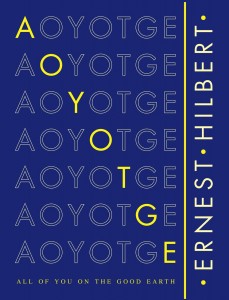Available from Amazon, Amazon UK, Amazon Canada, Barnes and Noble, Powell’s Books, The Book Depository, Tower Books, BookADDA (India), URead.com (India), BiblioVault, Angus & Robertson (Australia), The Nile (Australia), Open Trolley (Signapore), Mighty Ape (New Zealand), SuperBookShop (European Union), Loot (South Africa), and better book stores. It is also available directly from the press itself. If you are a book seller or work for a retail outlet, you may order from the publisher’s distributor, Chicago Distribution Center, 11030 S. Langley, Chicago, IL 60628, phone 800-621-2736, fax 800-621-8476.
Please consider buying a copy for yourself or someone else!
 RAW ENERGY WITH ELEGANT AND ORIGINAL LANGUAGE”: ALL OF YOU ON THE GOOD EARTH BY ERNEST HILBERT
RAW ENERGY WITH ELEGANT AND ORIGINAL LANGUAGE”: ALL OF YOU ON THE GOOD EARTH BY ERNEST HILBERT
HILBERT, Ernest. All of You on the Good Earth. Los Angeles: Red Hen Press, 2013. Small octavo, paper wrappers. $16.95. ISBN-10: 1597092665
All of You on the Good Earth, or AoYotGE, is the much-anticipated sequel to Ernest Hilbert’s critically-acclaimed debut Sixty Sonnets. At the end of the tumultuous year 1968, Apollo 8’s Commander Frank Borman described the earth-rise as sending “a torrent of nostalgia, of sheer homesickness, surging through me.” He signed off: “Good night, good luck, a Merry Christmas, and God bless all of you—all of you on the good Earth.” All of You on the Good Earth guides the reader through chambers occupied by visionary gravediggers, spaced-out movie stars, frenzied dropouts, sullen pirates, and unrelenting stalkers, noble war correspondents and cornered dictators, unlucky drunks and supercilious scientists, impatient goddesses and sad sea monsters, zoned-out denizens of Plutonian strip-clubs and earnest haunters of ancient ruins, the infamous Rakewell in TriBeCa and sea nymph Kalypso in a beach house at the Jersey shore, characters wandering an America demoralized by economic decline. These poems contain fasts and feasts, laments and love songs, histories, fantasies, and elegies, the amusing and heartbreaking debris of life on this world, all the while recalling Seneca’s dictum, non est ad astra mollis e terris via (“the road from the earth to the stars is not easy”). Justin Quinn observes of the collection that “Hilbert has written poems of superb lyricism. It’s hard to think of another poet with such range, and indeed with such brilliant delivery. Beauty, trash, exaltation, and humor are contained in his capacious and exacting forms. These are, quite simply, original and essential poems.” Adam Kirsch has further commented that “there is no mistaking the ‘feral’ appetite and intensity of these poems, or the bitter depths of experience they sometimes explore. What makes All of You on the Good Earth such a rare collection, however, is the way Hilbert unites that raw energy with elegant and original language, creating a style that sounds like no one else’s.” The poems in its pages first appeared in Parnassus, Harvard Review, The London Magazine, The Yale Review, Poetry East, The Oxonian Review, Georgetown Review, American Poetry Review, The New Criterion, The Dark Horse, New Ohio Review, RATTLE, Cimarron Review, and 66: The Journal of the Sonnet. The cover is designed by Jennifer Mercer, based on the cover of the first US edition of Ted Hughes’ collection Lupercal, published by Harper and Brothers in 1960. The book’s front panel is also an homage to the legacy of the 1970s São Paulo Noigandres “poesia concreta / konkrete poesie / concrete poetry” movement.
Read poems from the collection at the Academy of American Poets/Yale Review, Harvard Review, and The New Criterion
.
PRAISE FOR ALL OF YOU ON THE GOOD EARTH
These sixty new sonnets find Ernest Hilbert, “an earnest / Pilgrim of some kind,” charging up to the ruins of a shared and personal past as well into the ether of his own (mostly) earthbound head. Part shaman, part showman, he reaches his hand in, winks, and, with a flourish, produces one little marvel after another. Like Lowell before him, Hilbert has found in the sonnet a form of confinement that excites and accommodates a liberality of temperaments, rhetorics, bad thoughts, and big ideas, but where Lowell favored blank verse, Hilbert surprises with rhymes he unwinds with preternatural finesse. His material ranges from the all too familiar to visionary moments in which our debauchery brings us to “fall apart like ancient stars” or to witness a vaseful of stargazer lilies “unfastening like a vast nebula” with a “long pour of poisonous gas.” Retrospective, forward-looking, tonic and toxic, All of You on the Good Earth is a wonder of a book, and Hilbert’s best yet. – Timothy Donnelly, author of The Cloud Corporation, winner of the Kingsley Tufts Poetry Award
Hilbert has written poems of superb lyricism. It’s hard to think of another poet with such range, and indeed with such brilliant delivery. Beauty, trash, exaltation, and humor are contained in his capacious and exacting forms. These are, quite simply, original and essential poems. – Justin Quinn, author of American Errancy: Empire, Sublimity, and Modern Poetry
“Genes clarify the genius and the freak / And prove we descend from a feral band,” Ernest Hilbert writes in “Outsider Art,” and there is no mistaking the “feral” appetite and intensity of these poems, or the bitter depths of experience they sometimes explore. What makes All of You on the Good Earth such a rare collection, however, is the way Hilbert unites that raw energy with elegant and original language, creating a style that sounds like no one else’s. – Adam Kirsch, author of The Modern Element: Essays on Contemporary Poetry
Hilbert is one of our best rhymers since Robert Frost, and his poems have been compared by superb poets to those of John Berryman and Robert Lowell. We haven’t had a poetry like his—both seriously tough-minded and wryly self-chiding—to enjoy and mull over for a long time. – Alice Quinn, editor of Elizabeth Bishop’s Edgar Allan Poe & The Juke-Box: Uncollected Poems, Drafts, and Fragments
The poems of All of You on the Good Earth are tighter and brighter than those of Sixty Sonnets. It’s clear that Hilbert’s verse is not “sentenced to stay still.” The book “rolls and glows” through another sixty sonnets (an appellation one should not utter in Mr. Hilbert’s presence unless you’re buying a copy of the book from him and a drink for him) with an ear that has developed beyond what A.E. Stallings called “the roughed-up prose rhythms of speech” in Hilbert’s first collection. Far more than his previous work or the work of most other poets today, Hilbert in All of You on the Good Earth lets his poems live within the sound of words, meaning not subordinated to sound like in a Stein poem but enhanced and enlivened by it as in the best words of Eliot or Plath. This is a fine collection. – Literary Magnet



No Comments